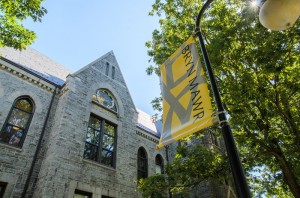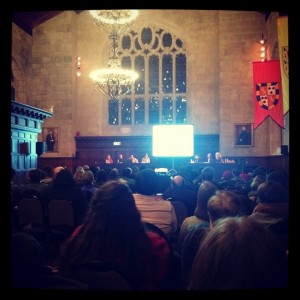 Most of our past reflections on the relationship between our digital mode and the content we publish have been concerned with how different platforms influence the messages we craft. However, we haven’t given as much space to the equally interesting matter of how the culture surrounding digital tools resonates with aspects of our subject matter.
Most of our past reflections on the relationship between our digital mode and the content we publish have been concerned with how different platforms influence the messages we craft. However, we haven’t given as much space to the equally interesting matter of how the culture surrounding digital tools resonates with aspects of our subject matter.
In September, Joshua Kim published an article in Inside Higher Ed entitled “Is Digital Culture Changing Academic Culture?” In the piece, Kim reflects on the contrast between “digital culture,” which he characterizes as rapidly-evolving and experimental, and the “solid and stable” nature of traditional academic culture. Each holds apparent value: the agile and non-hierarchical nature of digital culture allows for exciting collaborations to arise, stoking innovation, while the long-reaching histories of established universities lend “a foundation on which to build.” As digital scholarship percolates in institutions of higher education, conflicts (or at least growing pains) can arise, but Kim argues that despite the apparent incongruity, universities could reap great benefits by incorporating some of the aspects of digital culture that initially seem at odds with their tradition-oriented culture.
The article has stuck with me in the last few months as I’ve considered Kim’s point in relation to how schools address issues of social inequality on campus. Academic culture benefits from stability for many reasons, and tradition can be an integral and important part of educational experience (just ask a Mawrter). But there are ways that this constancy can feel like entrenchment that reach even beyond the domain of digital versus analog scholarship. Kim’s reflections on digital culture reminded me of current ongoing dialogues both in and outside of the academy on difficult issues such as race, gender, and sexual assault; issues in which rapidly evolving approaches to inclusion and identity run up against deeply ingrained societal problems.
What happens when institutional history, part of that solid “foundation” on which our academic prowess and our identity are built, poses an impediment to our efforts to hold our community and ourselves accountable in matters of privilege and power? It can be a struggle, especially at historically elite institutions such as Bryn Mawr, to align current practices and espoused values with the desire to honor institutional histories that are often histories of exclusion and violence.
This dynamic played out recently at Bryn Mawr’s Teach-In on Race, Higher Education, Rights and Responsibilities, a program offered by the Bryn Mawr Undergraduate Deans’ Office. The panel featured presentations from five speakers on different aspects of race in higher education, both in history and in current campus climate. Among the speakers was our Director, Monica Mercado, who provided “(A Short, Incomplete, and Often Invisible) History of Race and Higher Education,” that drew on the work of activists and scholars including Dean Spade, Craig Wilder, and Martha Biondi. The event grew out of a series of conflicts and conversations this past semester in which Bryn Mawr has grappled with how to create a space that supports and acknowledges all members of its diverse community, a dialogue that has taken place both physically and in distributed forms online. The structure of Monica’s dual role as historian of education and digital representative, both on the panel and in her greater capacity as Director of the Greenfield Digital Center, speaks to the ways in which digital tools and culture are being recognized as integral to current dialogues about race, history, and community. An audience member’s question to the panel called for discussion about how social media an important role by spreading, but also complicating, the conversation.
In his article, Kim asks whether it is possible to “preserve what is most valuable about traditional academic culture, while also incorporating the best elements of digital culture?” To broaden his question one step further, I would like to push our community to think about what lessons can be shared between digital culture and an academic community that strives to be inclusive and attentive to matters of social justice and inequality. Both digital culture and the culture of social justice and activism have challenges in common: for example, both feature by an ever-evolving (and sometimes opaque) vocabulary that can leave the uninitiated feeling ignorant and unincentivized to engage. The solution is to make resources for learning at all levels widely available, and to cultivate support for inquiry, mentorship, and self-education. Other attributes of digital culture that are worth learning from include:
- The prioritization of access
- Transparency of process, and, congruently, openness to feedback
- A spirit of experimentation that anticipates failure and mistakes but pledges to learn from them
- Value placed on a diversity of perspectives and skill sets, and initiatives that gather these diverse groups on collaborative projects.
Kim’s article argues that, despite their stable and hierarchical structures, universities may in fact be “the best place to embrace, and participate in” digital innovation (emphasis mine). My hope is that we can say the same about the difficult work of social progress. Despite the unique challenges posed by their privileged histories, colleges and universities still serve as loci of radical thinkers who drive change through bold critical inquiry and campus activism. And because college populations are small and self-selecting, they tend to foster introspective environments that are invested in consciously shaping their cultures. These qualities may help institutions like Bryn Mawr come to a new awareness of the contradictions between our legacies and our current mission which will stimulate, rather than hinder, the tough conversations.
…
Given the Greenfield Digital Center’s commitment to furthering these dialogues while applying and interrogating the digital lens, we are excited to be hosting the second iteration of the Women’s History in the Digital World conference this coming May on Bryn Mawr’s campus. The conference will gather experts, novices, and all those in between to share insights, lessons, and resources for the many projects emerging at the crossroads of history, the digital humanities, and women’s and gender studies. It will be a productive space in which to continue our inquiry into the relationship between digital methods and culture and the social systems on which they act! Our Call for Papers has been posted on the blog and is open until January 16th, 2015.
